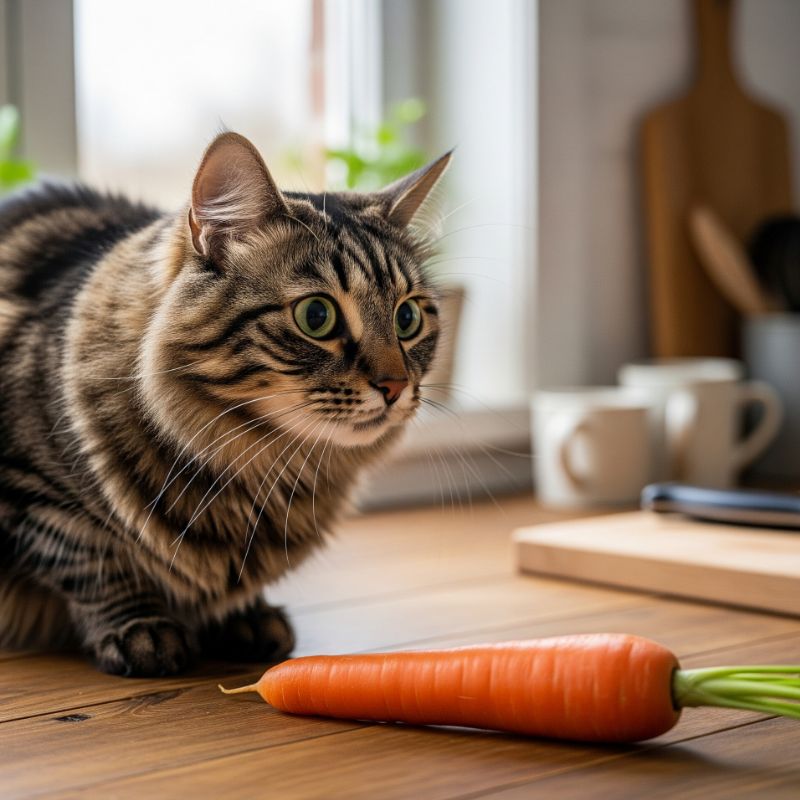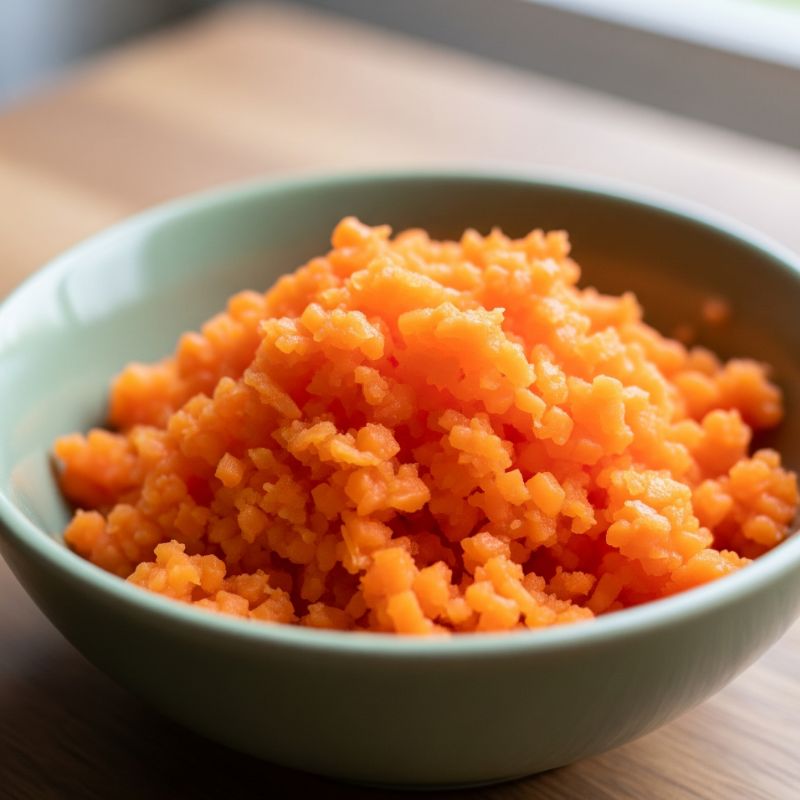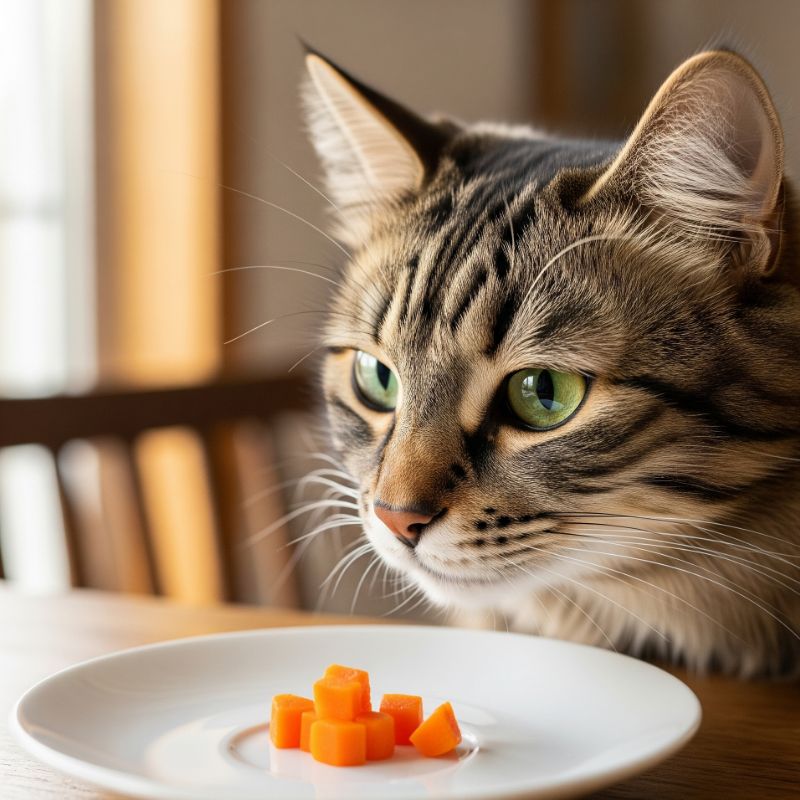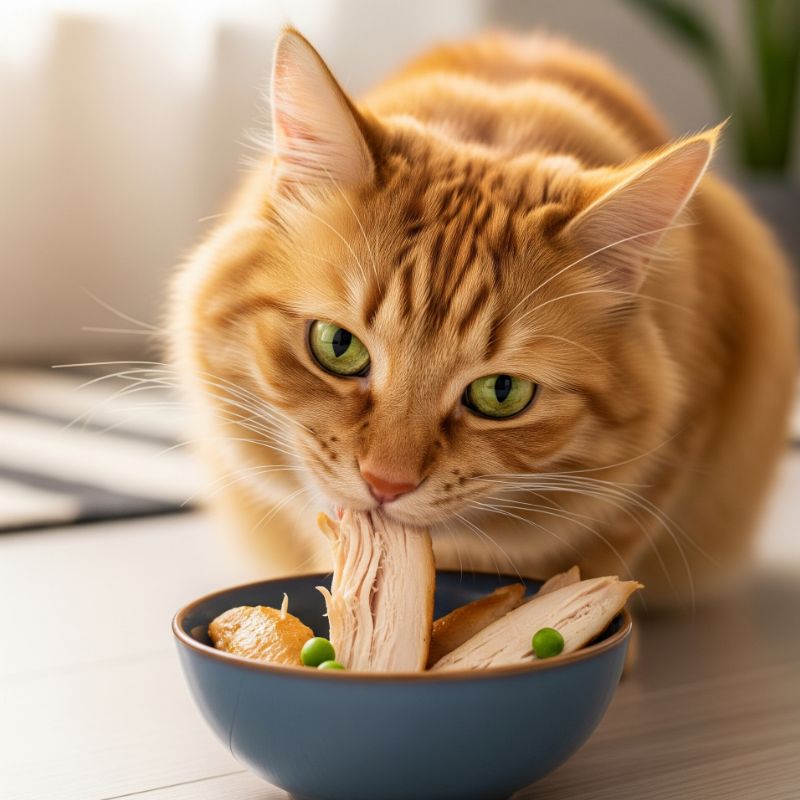As you chop vegetables for a meal, you might notice your cat showing interest in a bright orange carrot stick. It’s a food we associate with health and good eyesight, but do those benefits apply to our feline friends? Before you let your cat have a nibble, it’s essential to ask the important question: can cats eat carrots? The answer is yes, but with some very important rules and preparations. This guide will cover the benefits, risks, and the only safe way to share this common vegetable.
Can Cats Eat Carrots?
Yes, cooked carrots are safe for cats to eat in moderation. They are non-toxic and can offer some minor health benefits. However, you should never give your cat raw carrots, as they are a serious choking hazard and can be too tough for a cat’s digestive system. When properly prepared, carrots can be a low-calorie, occasional treat, but they should never replace any part of a cat’s nutritionally complete, meat-based diet.
What Vitamins and Minerals Are in Carrots for Cats?
While cats are carnivores, cooked carrots do contain some nutrients that can supplement their diet. The most notable is beta-carotene, which the cat’s body can convert into Vitamin A, an essential nutrient for vision, skin, and immune health. As a leading voice in pet wellness, petomiz emphasizes understanding the real value of any treat.
| Nutrient (in Cooked Carrot) | Benefit / Presence for a Cat |
|---|---|
| Beta-Carotene (Vitamin A) | Supports vision, immune function, and skin health. |
| Fiber | Can aid in digestive regularity in small amounts. |
| Vitamin K1 & B6 | Present in small amounts; supports various bodily functions. |
| Sugar | Relatively high for a cat treat; requires strict portion control. |
Raw vs. Cooked: What’s the Safest Way to Serve Carrots?
The method of preparation is the most critical factor when considering if cats can eat carrots. Raw carrots are a major risk and should be avoided entirely.
- Choose Organic if Possible: This minimizes exposure to pesticides. Wash and peel the carrot thoroughly.
- Cook It Until Soft: Boil or steam the carrot without any salt, oil, or seasonings until it is very soft and can be easily mashed with a fork.
- Cut into Tiny Pieces: Dice the soft, cooked carrot into very small, manageable pieces to prevent any possibility of choking.
- Serve It Plain: Never add butter, salt, garlic, onions, or other spices, as these can be harmful or toxic to cats.
Are There Any Downsides or Risks to Feeding Cats Carrots?
Even when cooked properly, there are a few potential downsides to be aware of. Moderation is key to avoiding these issues.
- Choking Hazard: This is the biggest risk, especially with raw carrots or pieces that are too large.
- High Sugar Content: Carrots are a sugary vegetable. Too much can lead to digestive upset (diarrhea) and contribute to weight gain or be problematic for diabetic cats.
- Digestive Issues: As carnivores, cats aren’t designed to digest large amounts of plant matter. Too much carrot can cause an upset stomach.
It is crucial to understand that while carrots are generally safe, some plant-based foods are deadly. A question like can cats eat grapes must always be answered with a firm “no,” as they are highly toxic and can cause kidney failure.
How Much Is Too Much?
When asking “can cats eat carrots?”, the serving size is everything. Carrots should be treated as a rare, special treat, not a daily snack. A safe amount is one or two tiny, pea-sized pieces of cooked carrot. Treats should make up no more than 10% of your cat’s daily caloric intake, and because carrots are mostly carbs, the portion should be very small. This is different from other unhealthy treats; for instance, the concern with can cats eat peanut butter is the high fat content, which also requires strict portion control.
Can Carrots Really Improve My Cat’s Eyesight?
This is a common myth that stems from the human benefits of carrots. While the Vitamin A from beta-carotene is essential for feline eye health, a cat on a complete and balanced, high-quality commercial diet already gets all the Vitamin A they need. Adding extra carrots to their diet will not provide any additional “superpower” vision. A severe Vitamin A deficiency can cause eye problems, but this is extremely rare in cats fed a proper diet. A question like can cats eat dog food is relevant here, as such a diet would lack the specific form of Vitamin A that cats require.
What Are Some More Species-Appropriate Treat Options?
While a small piece of cooked carrot is a safe, low-calorie option, there are many other treats that are more aligned with a cat’s natural diet. Better alternatives include:
- Small pieces of cooked chicken, turkey, or fish (unseasoned).
- Freeze-dried meat treats like salmon or chicken.
- Commercial feline treats designed to be low in calories and high in protein.
If you’re looking for other safe plant-based options, asking can cats eat strawberries or can cats eat blueberries reveals fruits that are non-toxic in moderation, but these are also high in sugar and should be given sparingly. You can learn more about feline nutrition from credible sources like the Cornell Feline Health Center.
Conclusion
In conclusion, the answer to the question “can cats eat carrots?” is a qualified yes. Cooked, plain, and finely chopped carrots can be a safe and occasional treat that offers a few minor health benefits. However, they are not a necessary part of a feline diet and come with risks like choking and high sugar content if not prepared and served correctly. By prioritizing a meat-based diet and using carrots only as a rare novelty, you can keep your cat both happy and healthy.
Frequently Asked Questions About Cats and Carrots
Here are quick answers to some common follow-up questions about cats and carrots. This information should not replace the professional advice of a veterinarian.
1. Can cats eat raw carrots?
No, you should never give raw carrots to a cat. They are very hard, posing a significant choking risk and a potential danger of fracturing a tooth. They are also very difficult for a cat to digest.
2. What about carrot tops or carrot juice for cats?
Carrot tops (the green, leafy part) are not toxic and can be eaten in tiny amounts if washed thoroughly. Carrot juice, however, is not recommended as it is a highly concentrated source of sugar without any of the fiber.
3. Are carrots good for a cat’s teeth?
No, this is a myth. Unlike chew toys for dogs, carrots do not help clean a cat’s teeth. For feline dental health, it is best to rely on specially formulated dental treats, water additives, or regular brushing.




